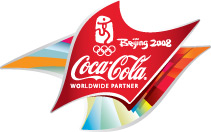Aug 24 2008
The first-time, across-the-board installation at the Olympic Games of an entire lineup of HFC-free coolers and vending machines marks a highly visible step forward in The Coca-Cola Company's long-range energy management and climate protection plan.

For the Beijing 2008 Olympic Games, 100 percent of the coolers and vending machines provided by Coca-Cola -- more than 5,600 "eKOfresh" units -- feature a natural refrigerant free of hydrofluorocarbons (HFCs), the greenhouse gases commonly used as refrigerants and as blowing agents in insulation foam. Some potent HFCs are 11,700 times more harmful than carbon dioxide (CO2) emissions.
"The world that right now is enjoying the best in athletic performance is the same world that wants the best for our environment," said Muhtar Kent, president and chief executive officer, The Coca-Cola Company. "To demonstrate our commitment to sustainable and responsible growth, Coca-Cola has integrated our latest advances in climate protection and energy conservation into our beverage operations for the Beijing 2008 Olympic Games."
Coolers and vending machines impact the climate in three ways: directly, through emissions from both the refrigerant gas and the insulation foam used in their cooling systems; and indirectly, through their energy use. The Coca-Cola Company has been working to reduce the environmental impact of refrigeration in all three areas.
The climate-friendly eKOfresh machines in operation at the Olympic Games also have been developed with a proprietary technology, called Energy Management System (EMS), that improves the energy efficiency of a cooler or vender by up to 35 percent.
The Coca-Cola Company's Energy Management and Climate Protection strategy is focused on decreasing the environmental impact of its operations and products. With refrigeration equipment representing the largest component of the Company's climate footprint, Coca-Cola has built a sustainable refrigeration technology program that is the cornerstone of all its energy management and climate protection efforts.
Compared with standard coolers and vending machines, the 5,600 eKOfresh units will emit approximately 4,000 fewer metric tons of greenhouse gases (GHGs) -- the equivalent of taking more than 19,000 cars off the road for two weeks.
"We're addressing head-on the key elements that affect the size of our carbon footprint, and we have at least 5,600 solid examples of this effort spread throughout the official venues," said Jeff Seabright, vice president, Environment and Water, The Coca-Cola Company. "This is the first time that every single cooler and vending machine provided by Coca-Cola for the Olympic Games includes HFC-free insulation and HFC-free natural refrigerant."
The Olympic Games in China do not mark the first appearance of HFC-free refrigeration units from Coca-Cola at the global sporting event: The Company provided some HFC-free units at both the Athens 2004 Olympic Games and the Torino 2006 Olympic Winter Games. But the Beijing 2008 Olympic Games represent by far the most-comprehensive placement of the machines at the Games.
The Coca-Cola Company actually has been working since the Sydney 2000 Olympic Games on ways to advance sustainable refrigeration, collaborating with the international environmental advocacy group Greenpeace on development and commercialization of climate-friendly equipment.
During the past eight years, Coca-Cola has invested nearly US $40 million in research, development, testing and deployment of sustainable refrigeration equipment. Part of that exercise identified carbon dioxide as a suitable, climate-friendly, natural refrigerant. Coca-Cola has since pioneered technologies that use CO2 -- which is 1,300 times less potent a greenhouse gas than the HFC refrigerant found in conventional refrigeration equipment -- as a safe and energy-efficient alternative to HFC refrigeration in coolers and vending machines.
Also through its R&D program, The Coca-Cola Company in 2006 completed the transition to HFC-free insulation foam for all new purchases of refrigeration equipment. The new insulation eliminates 75 percent of the direct GHG emissions from cooling equipment provided by the Company. (Any remaining direct greenhouse emissions would be the result of continued use of HFC refrigerant.)
The natural refrigerant used in the eKOfresh units Coca-Cola has placed in all official venues of the Beijing 2008 Olympic Games is a CO2 refrigerant.
Supported by Greenpeace, The Coca-Cola Company announced its broad refrigeration technology plan for the Beijing 2008 Olympic Games last September. By then, the Company already had about 7,500 eKOfresh coolers in the marketplace. Coca-Cola plans to expand its worldwide number of coolers and vending machines running on CO2 to more than 100,000 over the next three years.
In the general marketplace, coolers with the innovative EMS technology have delivered energy savings of up to 35 percent. The Coca-Cola Company within the past year surpassed placement of one million EMS units around the world.
Following the Beijing 2008 Olympic Games, the eKOfresh units used for the event will be redeployed in China by the local Coca-Cola bottling system.